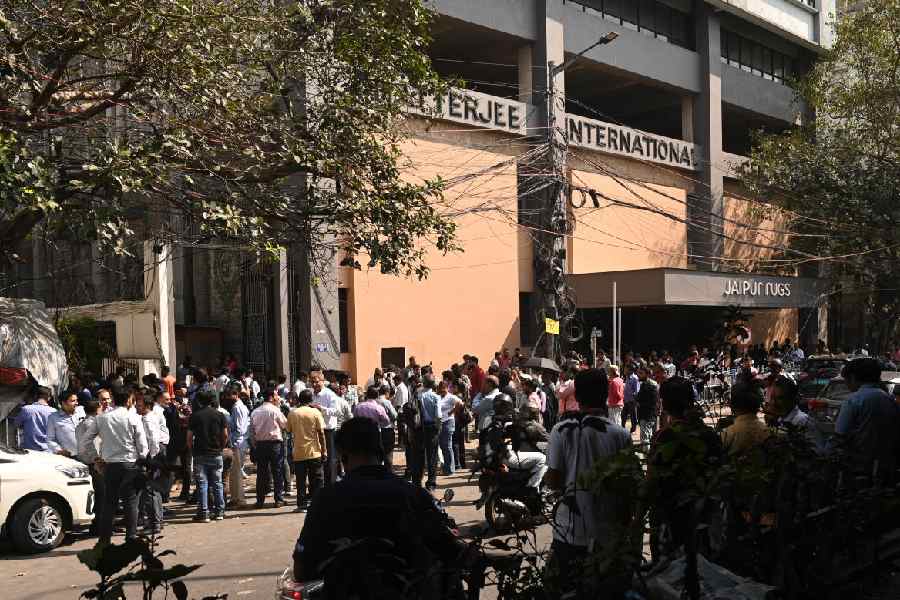So, here’s a story of our times: SN, a friend living in Delhi, ordered a laundry basket from a home décor store. When the box arrived, it was clear that it was far too big for SN’s flat — so she asked for the store to take it back. The store said it would send a courier service representative to pick it up. My friend had to leave town so her flatmate, VL, was entrusted with returning the box. The saga began when the courier service, let’s call it Daily-Worry Couriers, sprang the pick-up time on SN with only two hours
notice; VL was at work and could not be home to do the hand over. SN managed to reschedule the pick-up on a day when VL was home. The courier executive arrived and tried to scan the unopened box for his system but the scanner refused to take the barcode, apparently because it was for the wrong warehouse. The courier executive (let’s call him CE) sent an OTP to SN to cancel the pick up and went off.
The store then sent SN a PDF of a sticker on WhatsApp, saying that she should share this with CE when he next came. On his next visit, CE (same man) called SN a couple of times but she couldn’t hear anything on the line. VL then called her to say that the courier was trying to get in touch but by the time SN could speak to CE he had already cancelled the pick-up. When CE came the third time, VL had the sticker PDF on her phone. CE arrived and scanned the sticker successfully. He then called his supervisor and told VL he also needed an invoice. VL did not have the invoice and was about to get on a Zoom meeting. She called SN who scrabbled around in her email inbox and found the order details from the store; she took a screenshot of this and sent it to both VL and to CE. But CE said his supervisor was refusing to accept this photo and that he needed a paper invoice or challan. VL opened the unopened box to see if there was some sort of an invoice inside, but there wasn’t. She told CE he should take the parcel and go, and began to shut the door. CE kept insisting on his piece of paper, saying he had now scanned the parcel so it would show that he had collected it but it wouldn’t go up the chain and he would be charged for it. VL shut the door but the man kept ringing the doorbell. Slightly afraid, she called through the door and asked him to come back two hours later. In the meantime, SN called CE and asked him to stop harassing her friend and to not go back to the flat. CE’s response was, “Why only once, if I have to ring the doorbell ten times I will keep ringing it. I cannot have the money for this item deducted from my account.” SN got his supervisor’s number from CE. The supervisor, clearly another young man, was even ruder. When she threatened him with a police complaint he was unfazed: “No one can do anything to us. We will not stop till we get that paper.”
SN tried to contact Daily-Worry to lodge a complaint but found that was tricky: the phone number on its website was wrong; the only way you could contact the firm in writing was by downloading its app, which demanded all your information. SN finally managed to get through to the store team on the phone which intervened to stand down the Daily-Worry people and sent ‘a porter’ to pick up the box. The porter came on a motorcycle and demanded extra money for moving such a big box. VL told him to deal with the people who had sent him and she could hear him in the lane below, having a shouting match with someone before leaving with his load.
Looking back, SN remarked how the whole incident was shot with low-level fear. While he didn’t physically threaten her, VL was shaken by the agitation of the young CE and his repeated ringing of her doorbell. Speaking to CE on the phone, SN could hear that his bravado was undercut by anxiety; even the supervisor, for all his arrogance, was clearly desperate for a piece of non-existent paper for an item worth 2,800 rupees. Daily-Worry Couriers clearly loomed over these men’s lives with whip in hand.
Over the last decade or more, and especially after the imploded Covid years, we, a certain class of urban Indians, have become used to having almost everything we need being brought to our doorsteps. From washing machines to pizzas to taxi rides, everything comes and parks just outside our houses. From time to time, things don’t go smoothly — the wrong food order ambushes us, or the pizza is correct but crumpled like a car accident victim inside the box; the app taxi drivers keep delaying and de facto cancelling the rides, hoping to pick up cancellation charges instead of an unprofitable fare; sometimes (perhaps only in Calcutta), the delivery takes weeks instead of the promised two or three days because the delivery men can’t be bothered to do more than a certain amount of work, or so it seems. What we, the Ordering Class, fail to see through the curtain of our entitled irritation is the whole, nasty, ruthlessly exploitative economy on which our internet-driven comfort and convenience rest.
When the food delivery ‘boy’ (as people tend to call the soldiers of this army of grown young men) insists on taking a phone-photo of the food packet in front of your door, he is not invading your privacy; he’s garnering proof to avoid late penalties; when the Zomiggy man calls you four times to deliver your fast-cooling galauti kebabs, he is not necessarily being obtuse; he is possibly new to the area and is panicked by the maze of residential tower fortresses with crazy, unpronounceable names; when an app taxi driver delays or cancels on you without notice, he could be trying to cheat or he could be bludgeoned by traffic and glitches on the GPS as he tries to make ends meet.
Walking down the street from my building, I always pass a row of young men in their orange or red uniform shirts, all leaning on their battered bikes and mopeds, chatting with one another, necks craned down as though yoked to their phone screens. If I pause to actually look at them, I find myself recognising a few from the times I’ve seen them at my door. As I make my way, walking on the road next to the impassable sidewalk, navigating the edge of the traffic, one of these delivery executives will tear past, nearly taking my arm off. ‘Hey!’ I almost want to shout, ‘I’m your customer! Don’t you recognise me?’ To answer the foolish, unasked question, of course he doesn’t: just as he is an anonymous delivery entity to us, we — the Ordering Beings — too are mostly anonymous to him, possibly individual doorbells and doorways more than people, targets to be met, potential complainers who might damage his naukri, privileged dross to be forgotten along with the fragrant food orders and goods parcels that can sometimes cost more than what he earns in a month or even a year.










